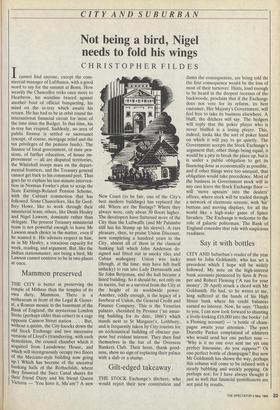Mammon preserved
THE CITY is better at preserving the temple of Mithras than the temples of its own diety, Mammon. There is a mithraeum in front of the Legal & Gener- al, a Roman mosaic in the basement of the Bank of England, the mysterious London Stone (perhaps older than either) in a cage Opposite Cannon Street station . . . . But, Without a qualm, the City knocks down the old Stock Exchange and two successive versions of Lloyd's (transferring, with each demolition, the council chamber which it acquired from Lansdowne House, and Which will incongruously occupy two floors of the Meccano-style building now going up.) Which has become of the ancestral banking halls of the Rothschilds, where they financed the Suez Canal shares for their friend Dizzy and his friend Queen Victoria — 'You have it, Ma'am'? A new
New Court (to be fair, one of the City's best modern buildings) has replaced the old. Where are the Barings? Where they always were, only about 30 floors higher. The developers have flattened more of the City than the Luftwaffe (and Mr Palumbo still has his Stump up his sleeve). A rare pleasure, then, to praise Union Discount, now completing a hundred years in the City, almost all of them in the classical banking hall which John Anderson de- signed and fitted out in smoky tiles and Cuban mahogany. Union was lucky (though, at the time, may have felt itself unlucky) to run into Lady Dartmouth and Sir John Betjeman, and the hall became a listed building. So it should be, not only on its merits, but as a survival from the City at the height of its worldwide power. Another, oddly enough, is the legacy of a forebear of Union, the General Credit and Finance Company. This is the Venetian palazzo, cherished by Pevsner Can amaz- ing building for its date, 1866') which stands next to St Margaret's, Lothbury, and is frequently taken by City tourists for an ecclesiastical building of obscure pur- pose but evident interest. They then find themselves in the bar of the Overseas Bankers Club. Their hosts, thank good- ness, show no sign of replacing their palace with a slab or a stump.


















































 Previous page
Previous page